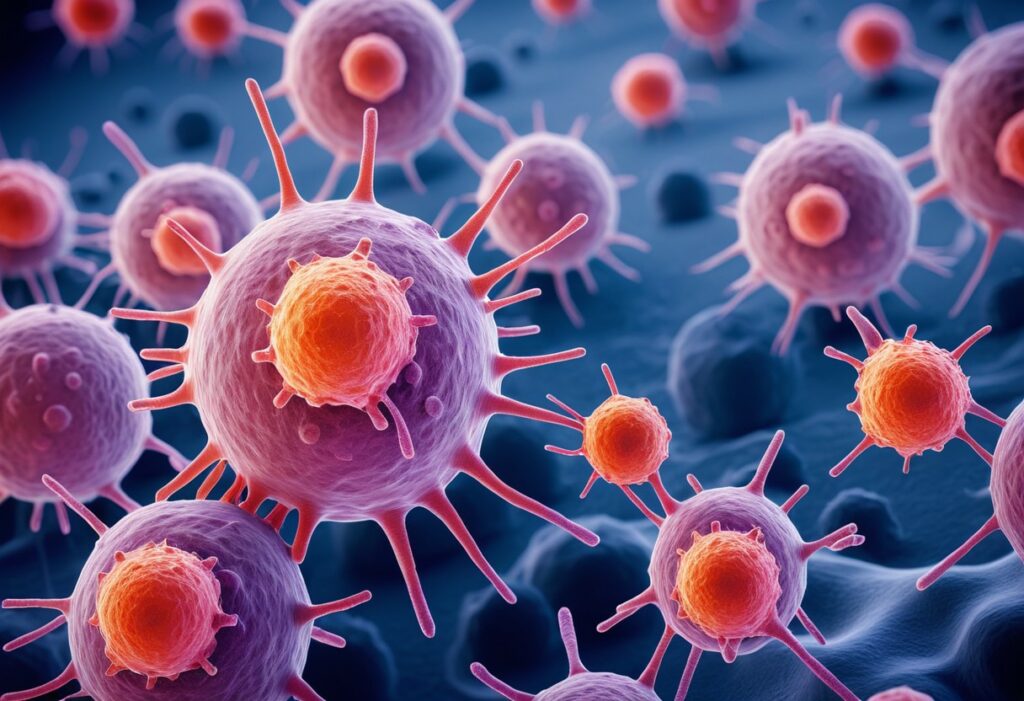Cancer is a complex group of diseases that still causes a lot of sickness and death globally. Knowing what leads to cancer is really important for stopping it early or treating it well. This article talks about all the different things that can cause cancer, some that we can change and some that we can’t.
Genetic Predisposition
Cancer is a complicated illness caused by changes in genes that make cells grow out of control. While things in the environment can contribute to getting cancer, some people are more likely to get it because of their genes. This article talks about how genes can affect the chances of getting cancer and how testing and counseling can help.
Hereditary Cancer Syndromes
Some people inherit gene mutations that greatly increase their risk of getting certain kinds of cancer. These mutations can run in families and make cancer more likely to happen. Here are a few examples:
- BRCA1 and BRCA2 Mutations: Changes in these genes raise the chances of breast, ovarian, prostate, and pancreatic cancers. Women with these mutations have a much higher risk of getting breast and ovarian cancer than most people.
- Lynch Syndrome: This condition, also called hereditary nonpolyposis colorectal cancer (HNPCC), is caused by gene mutations that affect DNA repair. People with Lynch syndrome have a higher chance of getting colorectal cancer, as well as other cancers like endometrial, ovarian, stomach, and urinary tract cancers.
- Familial Adenomatous Polyposis (FAP): FAP leads to many polyps in the colon and rectum, which can turn into colorectal cancer if not treated. It’s caused by mutations in the APC gene, and people with FAP almost always get colorectal cancer if they don’t get treatment.
- Li-Fraumeni Syndrome: This rare condition is caused by mutations in the TP53 gene. People with Li-Fraumeni syndrome have a higher chance of getting many different kinds of cancer, including breast cancer, sarcoma, brain tumors, and leukemia, starting at a young age.
Genetic Testing and Counseling
Genetic testing is important for finding out if someone is at a higher risk for hereditary cancer syndromes. It can identify specific gene mutations linked to these syndromes, so people can make informed choices about their health. Genetic counseling helps people understand what their test results mean and how they can make decisions about their health based on them.
The Impact of Genetic Predisposition on Personalized Cancer Care
Knowing if someone has a genetic risk for cancer can change how they’re cared for. They might need more frequent screenings or different kinds of treatments to catch cancer early or prevent it from happening. Some people might even choose to have surgery or take medicine to lower their risk of getting cancer.
Understanding how genes affect cancer risk is important for finding it early and treating it effectively. Genetic testing and counseling help people learn about their risk so they can make choices that keep them healthy.
Environmental Exposures
The number of cancer cases worldwide keeps going up, and a big reason for this is exposure to things in our environment that can cause cancer. This section talks about how different things around us, like tobacco smoke and air pollution, can raise the risk of getting cancer, and what people and policymakers can do to lower that risk.
Tobacco Smoke
Smoke from cigarettes is a well-known cause of cancer and leads to many cancer-related deaths globally. Cigarette smoke has thousands of chemicals, including some that are known to cause cancer like polycyclic aromatic hydrocarbons (PAHs), nitrosamines, and benzene. Smoking is strongly linked to lung cancer and other types of cancer like those in the mouth, throat, esophagus, pancreas, bladder, and cervix. Being around someone who smokes (secondhand smoke) is also risky, especially for people who don’t smoke themselves.
Air Pollutants
Air pollution, both outside and indoors, is another big factor that raises the risk of cancer. Things like fine particles in the air (PM2.5), nitrogen dioxide (NO2), sulfur dioxide (SO2), ozone (O3), and certain chemicals from cars, factories, and even cooking and heating in homes can contribute to cancer. Breathing in polluted air for a long time can increase the chances of getting lung cancer and other health problems. Cleaning up the air by using cleaner energy, setting rules for emissions, and planning cities better are important to protect people’s health and lower cancer risk.
Industrial Chemicals
People who work with chemicals in jobs like mining, construction, manufacturing, and chemical production face risks of getting cancer from exposure to things like asbestos, benzene, formaldehyde, arsenic, and vinyl chloride. Spending a long time around these substances can lead to cancers like lung cancer, mesothelioma, leukemia, bladder cancer, and others. Making workplaces safer with good ventilation, protective gear, and regular checks for harmful chemicals is key to keeping workers healthy.
Pesticides
While pesticides are used to protect crops from pests, they can harm people’s health too. Many pesticides contain chemicals that can cause cancer, like organochlorines, organophosphates, and glyphosate. People who work on farms or live in farming areas are more likely to be exposed to these chemicals and have a higher risk of cancers like non-Hodgkin lymphoma, leukemia, and prostate cancer. Using safer farming methods, like organic farming, and setting rules for pesticide use are important steps to lower the risk of cancer from pesticides.
Radiation
Exposure to radiation, whether from the sun, medical tests like X-rays, or jobs in industries like nuclear power, can also raise the risk of cancer. Too much sun exposure can cause skin cancer, while medical tests that use radiation or jobs where people are exposed to radiation can lead to different types of cancer too. Being careful in the sun, avoiding unnecessary medical tests with radiation, and making sure people who work with radiation are protected are ways to lower the risk of cancer from radiation.
Infectious Agents
Certain infections caused by viruses, bacteria, and parasites can also lead to cancer. For example, the human papillomavirus (HPV) can cause cervical cancer and other cancers, while hepatitis B and C viruses (HBV and HCV) can cause liver cancer, and Helicobacter pylori can lead to stomach cancer. Vaccines for HPV and HBV, and tests and treatments for infections like HCV and H. pylori, can help prevent these kinds of cancers.
Lots of things in our environment can raise the risk of cancer, but there are ways to lower that risk. Protecting people from harmful substances at work, setting rules to keep the air clean, using safer farming methods, being careful with radiation, and preventing infections are all important steps to prevent cancer. By spreading the word about how the environment affects cancer risk and pushing for policies that make the environment safer, we can work together to reduce the number of cancer cases and keep people healthy.
Lifestyle Factors
Cancer is a complicated illness affected by many things like genes, the environment, and how we live. While genes and the environment are big factors, the way we live can also play a big part in how likely we are to get cancer. This part talks about how different lifestyle choices, like smoking, what we eat, how active we are, drinking alcohol, being overweight, and being out in the sun, can affect our chances of getting cancer.
Smoking
Smoking is the biggest cause of cancer that could be prevented, causing a lot of cancer deaths around the world. Smoking cigarettes, in particular, raises the chance of getting lung cancer, as well as cancers in the mouth, throat, esophagus, pancreas, bladder, cervix, and kidney. It’s not just smokers who are at risk; being around someone who smokes (secondhand smoke) can also be dangerous, especially for people who don’t smoke themselves. Quitting smoking and avoiding secondhand smoke are important ways to lower the risk of getting these kinds of cancers.
Eating Unhealthy Food
What we eat matters when it comes to preventing cancer. Eating a lot of processed foods, red and processed meats, and fats that are not good for us has been linked to higher chances of getting cancers like colorectal, prostate, and pancreatic cancer. On the other hand, eating plenty of fruits, vegetables, whole grains, and lean proteins can help lower the risk of cancer. Eating a plant-based diet that’s high in fiber, vitamins, minerals, and natural chemicals from plants can be good for preventing cancer. It’s also important to limit sugary drinks, processed meats, and foods with lots of salt and unhealthy fats to lower cancer risk.
Being Active
Regular exercise can lower the risk of getting certain types of cancer, like breast, colon, endometrial, and prostate cancers. Exercise helps keep a healthy weight, boosts the immune system, and reduces inflammation, all of which help lower cancer risk. The American Cancer Society recommends adults do at least 150 minutes of moderate exercise or 75 minutes of intense exercise every week to lower the risk of cancer. Doing activities like walking, biking, swimming, and strength training can have a big impact on health and reduce the chances of getting cancer and other diseases.
Drinking Too Much Alcohol
Drinking too much alcohol raises the chances of getting cancer, especially cancers in the mouth, throat, esophagus, liver, breast, and colon. Alcohol is even considered a cause of cancer by experts. The more someone drinks, the higher the chance of getting cancer. To lower cancer risk, it’s best to drink alcohol moderately, which means up to one drink a day for women and up to two drinks a day for men. Not drinking alcohol at all is the safest option for preventing cancer, especially for those who are more likely to get alcohol-related cancers.
Being Overweight
Being overweight raises the risk of getting cancer, especially cancers like breast, colon, endometrial, kidney, pancreatic, and esophageal cancers. Fat tissue makes hormones and proteins that cause inflammation and cell growth, which can lead to cancer. Keeping a healthy weight by eating right and exercising regularly is key to preventing cancer. Making lifestyle changes to get to and stay at a healthy weight can lower cancer risk and make overall health better.
Sun Exposure
Getting too much sunlight, especially UV radiation, raises the risk of getting skin cancer like basal cell carcinoma, squamous cell carcinoma, and melanoma. UV radiation damages the DNA in skin cells, causing changes that can turn into cancer. Being in the sun too much, especially between 10 a.m. and 4 p.m., not protecting skin from the sun, and using tanning beds can all increase the risk of skin cancer. Protecting skin by wearing protective clothing, using sunscreen with high SPF, staying in the shade, and avoiding tanning beds are important ways to lower the risk of skin cancer.
The way we live can affect our chances of getting cancer. Making healthy choices like not smoking, eating well, being active, drinking alcohol moderately, staying at a healthy weight, and protecting skin from the sun can lower the risk of cancer and make overall health better. Public health efforts that encourage healthy habits and make it easier for people to live healthier lives can help even more people lower their cancer risk and live better.
Chronic Inflammation and Immune Dysfunction
Cancer is a big problem all over the world, causing a lot of sickness and death. It happens because of many different things like genes, the environment, the way we live, and how our immune system works. In this article, we talk about two important factors that can lead to cancer: chronic inflammation and immune dysfunction. We’ll explain what they are, how they’re connected to cancer, and what we can do about it.
Chronic Inflammation
Chronic inflammation means the body is constantly fighting something, and this can lead to cancer. Things like inflammatory bowel disease, long-lasting viral infections (like hepatitis B and C or human papillomavirus), autoimmune diseases (where the body attacks itself), and exposure to harmful substances in the environment can all cause chronic inflammation and raise the risk of cancer. Inflammation can damage DNA, increase stress on cells, mess with the body’s signals, and make it easier for cancer to grow. Medicines like aspirin, steroids, and special drugs that fight inflammation might help prevent or treat cancer by stopping the inflammation.
Immune Dysfunction
Immune dysfunction means the body’s defense system isn’t working right, so it can’t find and destroy cancer cells like it’s supposed to. Conditions like AIDS (where the immune system is weak), genetic problems that affect the immune system, and taking medicines that weaken the immune system after organ transplants can make it easier to get certain types of cancer, especially ones caused by viruses. Cancer cells can trick the immune system by hiding from it or stopping it from working properly. New treatments called immunotherapies help the immune system fight cancer by using special proteins or cells to target and kill cancer cells.
How Chronic Inflammation and Immune Dysfunction Work Together
Chronic inflammation and immune dysfunction are like two problems that make each other worse, making it easier for cancer to grow and spread. Inflammation sends out signals that change how the immune system works and bring in different types of immune cells to the tumor area. These immune cells can release substances that keep inflammation going and help cancer cells grow. Understanding how these two things work together is important for finding new ways to treat cancer by stopping the signals that help cancer grow and bringing back the immune system’s ability to fight cancer.
What This Means for Preventing and Treating Cancer
Stopping chronic inflammation and fixing immune problems are good ways to help prevent and treat cancer. Making healthy choices like eating well, staying active, not smoking, and not drinking too much alcohol can lower inflammation and make the immune system stronger. Medicines that fight inflammation or boost the immune system might also help prevent or treat cancer. New treatments called immunotherapies use the body’s immune system to fight cancer in ways we didn’t think were possible before.
Chronic inflammation and immune dysfunction are big parts of why cancer happens. By understanding how they work together and finding new ways to treat them, we can help more people avoid cancer and live healthier lives. Researchers are working hard to learn more about how these things cause cancer and how we can stop them. By doing this, we can fight cancer better and make sure more people stay healthy.
After researching credible sources on the web, my aim in writing health-related articles is to provide a basic idea about the anatomy of organs in our body and related health issues. Always consult your physician or another qualified healthcare provider if you have any questions about a medical condition or treatment plans.










More Stories
Inside the Hormonal Symphony: Understanding the Endocrine System
Understanding Gallstones: Causes, Symptoms, and Treatment Options
Cells: The Foundation of Life